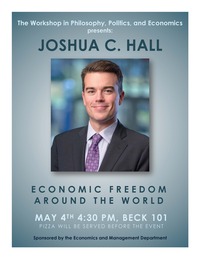Workshop in Philosophy, Politics, and Economics
Workshop in Philosophy, Politics, and Economics was established to broaden students' understanding of the connection between entrepreneurship, innovation, individual liberty, and economic growth.
If you have suggestions for future events, questions, or would like to learn more, contact Marta Podemska-Mikluch.
2021 - 2022
Guest Lecture: "Access to Care and Physician Mobility Under the Interstate Medical Licensure Compact" by Darwyyn Deyo, Assistant Professor of Economics at San Jose State University
Date: Monday, March 14, 2022
Location: Beck Hall 201
Time: 4:30 p.m. – 5:30 p.m
Darwyyn Deyo is an Assistant Professor of Economics at San José State University who publishes on law and economics, health economics, and economic history of thought. She is also a Senior Research Fellow with the Institute for Justice, and a Visiting Scholar with the Knee Center for the Study of Occupational Regulation, in which capacity she works on interdisciplinary research with other scholars and graduate students. She also teaches law and economics and labor economics to both undergraduate and graduate students, with a focus on bringing research into the classroom. She earned her PhD in Economics from George Mason University. She is also an alumnus of Saint Mary’s College of California, where she earned a dual Bachelor of Science in Economics and a Bachelor of Arts in International Area Studies. Prior to joining San José State University in 2017, she worked as a Research Fellow with the Harvey L. Neiman Health Policy Institute and was an affiliate scholar with the Center for Micro-Economic Policy Research at George Mason University. Before beginning her doctorate, she also worked as an investigative journalist in Pennsylvania.
Medical professionals in the United States must comply with some of the highest barriers-to-entry among licensed occupations. Although states require additional physician licensing, these licenses do not transfer between states, limiting physician mobility and access to care for patients. The Interstate Medical Licensure Compact (IMLC) addresses this issue by recognizing out-of-state licenses from participating states for physicians with MD or DO credentials. Physicians can change their primary state of practice, practice in multiple states, and provide telehealth services to patients in other states. The first IMLC state legislation passed in 2015 and 29 states now participate in the compact. We estimate whether the IMLC has changed physician migration between IMLC and non-IMLC states using the National Downloadable Files from the Centers for Medicare and Medicaid Services. We apply a difference-in-differences model to estimate whether the IMLC increased the number of states in which physicians practiced and whether physicians moved to IMLC states. Preliminary results indicate that the first round of IMLC legislation in 2015 significantly increased physician migration to IMLC states by 0.35 percent. Future work will analyze additional cohorts, as well as if the IMLC changed the survival rate for physician practices and the location choices of physicians.
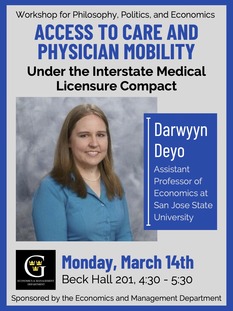
Guest Lecture: “How to Cure Cancer: Unbinding Entrepreneurs in Medicine” by Arthur Diamond, Professor of Economics at the University of Nebraska Omaha
Date: Monday, March 28, 2022
Location: Beck Hall 201
Time: 4:30 p.m. – 5:30 p.m
Arthur M. Diamond, Jr. earned graduate degrees in philosophy and in economics from the University of Chicago and is currently Professor of Economics at the University of Nebraska Omaha. Diamond has published many journal articles on labor economics, economics of technology, and economics of entrepreneurship. His Openness to Creative Destruction: Sustaining Innovative Dynamism was published by the Oxford University Press. The book shows how life has improved through innovation, how innovation has occurred through the efforts of inventors and innovative entrepreneurs, and how policies can be crafted to encourage the innovative entrepreneur to bring us more innovations. Diamond is currently on sabbatical to work on his next book, Less Costs, More Cures, arguing that we should unbind medical entrepreneurs to allow them to pivot toward serendipitous discoveries and to pursue nimble trial-and-error experiments that will improve our health and lengthen our lives.
Medical central planners declared war on cancer in the 1960s but did not achieve the unconditional surrender that they sought. To speed future cures, we need to look at the traits and practices of medical entrepreneurs who achieved breakthroughs in the past and learn what policies enabled their progress. For example, Emil Freireich cured childhood leukemia and Vincent DeVita cured Hodgkin’s Lymphoma, by pursuing quick trial-and-error experimentation in their anti-cancer chemotherapy cocktails. But FDA regulations, often defended as exemplars of the precautionary principle, greatly restrict such experimentation by medical entrepreneurs, thereby delaying cancer cures and costing lives.
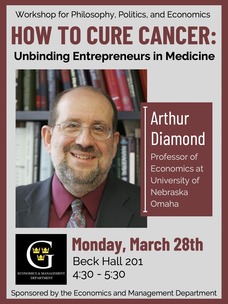
2018 - 2019
Guest Lecture: Can friendships survive contact with the market? - Ginny Choi of the Mercatus Center at George Mason University
Date: Tuesday, December 4th, 2018
Location: Beck Hall 101
Time: 4:30 p.m. – 5:30 p.m
Ginny Choi is an Associate Director of Academic & Student Programs and a Senior Fellow in F.A. Hayek Program for Advanced Study in Philosophy, Politics, and Economics, and a Senior Research Fellow at The Mercatus Center at George Mason University. She specializes in Austrian and experimental economics. Her research primarily focuses on the moral and social aspects of markets. She is currently writing a book titled A Moral Case for Markets with Virgil H. Storr (George Mason University). Choi earned her Ph.D. in Economics from George Mason University (Fairfax, VA), M.A. in Economics from New York University (New York, NY) and B.A. in Economics from Emory University (Atlanta, GA).
Can friendships survive contact with the market? - Critics of markets have often asserted that markets undermine morality and that market dealings are unfair and corrupting. In their perspective, the expansion of the market and market values taint the nature of the goods being exchanged and the relationships between the parties to the deal. This chapter gives reasons to suspect this critique of markets and attempts to push back against these complaints. It argues that the market is a social arena where individuals not only pursue their material goals but also exercise their moral selves; after all, meaningful social bonds characterized by trust and trustworthiness can and do develop in market settings. The market depends on and promotes trust and trustworthiness as well as fairness and reciprocity and these values, as suggested by experimental economic evidence, play important roles in successful market exchanges.
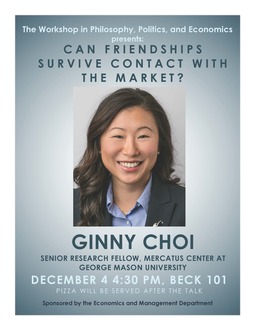
Guest Lecture: Wealth-Destroying Private Property Rights - prof. Colin Harris of St. Olaf College
Date: Tuesday, November 13th, 2018
Location: Beck Hall 101
Time: 4:30 p.m. – 5:30 p.m
Colin Harris is the Tomson Family Assistant Professor of Law and Economics at St. Olaf College. He received his Ph.D. in Economics from George Mason University in 2018 where he specialized in Law and Economics and Public Choice. His research focuses broadly on the economics of property rights and the implications for development and free enterprise. He's primarily interested in understanding issues that result from property rights being poorly attuned to the underlying market conditions. His research has appeared in journals such as World Development, Rationality and Society, and the Journal of Institutional Economics.
Professor Harris will present his paper Wealth-Destroying Private Property Rights which was published recently in World Development.
According to conventional wisdom, privatizing the commons will create wealth. Yet in cases found throughout the developing world, privatizing the commons has destroyed wealth. To explain this phenomenon, we develop a theory of wealth-destroying private property rights. Privatization's effect on social wealth depends on whether privatizing an asset confers net gains or imposes net losses on society. The decision to privatize, however, depends on whether privatizing an asset confers net gains or imposes net losses on property decision makers. When decision makers are residual claimants, these effects move in tandem; privatization occurs only if it creates social wealth. When decision makers are not residual claimants, these effects may diverge; privatization occurs if it benefits decision makers personally even if privatization destroys social wealth. We apply our theory to understand wealth-destroying land privatization in Kajiado, Kenya.
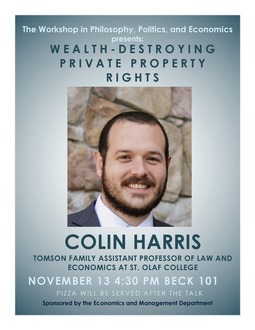
2017 - 2018
In the 2017-18 academic year, the workshop focused on preparing students for the 2018 Lindau Residency in Conservative Thought. This year, the residency lecture was given by professor Walter E. Williams. In preparation for the lecture, students participated in a reading group that studied and discussed Williams's "Race and Economics."
 Participants of the reading group after lunch with professor Williams. From the left: Daniel Barnes '19, Erica Jenson '18, Jacob Herd '18, Walter E. Williams, Oluwatamilore Adeola '19, professor Marta Podemska-Mikluch, Shaun Gilyard '19, and Bryan Khoo '19.
Participants of the reading group after lunch with professor Williams. From the left: Daniel Barnes '19, Erica Jenson '18, Jacob Herd '18, Walter E. Williams, Oluwatamilore Adeola '19, professor Marta Podemska-Mikluch, Shaun Gilyard '19, and Bryan Khoo '19.
2016 - 2017
Guest Lecture: Turning Economics into Entrepreneurship by Niko Skievaski
Date: Monday, May 1st, 2017
Location: Beck Hall 101
Time: 4:30 p.m. – 5:30 p.m
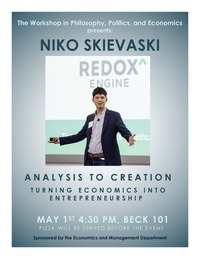
Date: Monday, October 31st, 2016
Location: Beck Hall 101
Time: 4:30 p.m. – 5:30 p.m
We live in entrepreneurial times. The business leaders who shape our increasingly globalized economy—and who can respond creatively to its changing demands—must have not only technical abilities but entrepreneurial character. In this talk, philosopher professor Stephen Hicks will discuss how virtues of character are essential to (1) personal success in one's career, (2) leadership in one's firm, and (3) being a citizen in an open society. For a short paper introducing the topic, check here.
Stephen Hicks is a Canadian-American philosopher who teaches at Rockford University, where he also directs the Center for Ethics and Entrepreneurship. He is the author of three books: Explaining Postmodernism: Skepticism and Socialism from Rousseau to Foucault (Scholargy Publishing, 2004; Expanded Edition, 2011). Nietzsche and the Nazis (Ockham's Razor, 2010). The Art of Reasoning: Readings for Logical Analysis (co-edited with David Kelley, W. W. Norton & Co., 1994, second edition 1998). His writings have been translated into fourteen languages: Portuguese, Spanish, German, Korean, Persian, Serbo-Croatian, Polish, Swedish, Hindi, Russian, Ukrainian, Cantonese, French, and Arabic. He has published in academic journals such as Business Ethics Quarterly, Teaching Philosophy, and Review of Metaphysics, as well as other publications such as The Wall Street Journal and The Baltimore Sun. In 2010, he won his university's Excellence in Teaching Award. He has been Visiting Professor of Business Ethics at Georgetown University in Washngton, D.C., a Visiting Fellow at the Social Philosophy & Policy Center in Bowling Green, Ohio, and Senior Fellow at The Objectivist Center in New York. He received his Bachelor's and Master's degrees from the University of Guelph, Canada, and his Ph.D. in philosophy from Indiana University, Bloomington. More information about Dr. Hicks's courses, publications, and blog can be found at his website: www.StephenHicks.org.
2015 - 2016
Guest Lecture: Capitalism and the Family by prof. Steve Horwitz of Saint Lawrence University
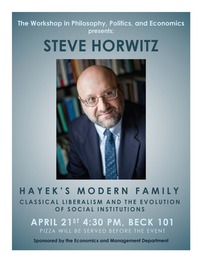
2014 - 2015
Screening: Poverty, Inc. Fighting poverty is big business. But who profits the most?
Followed by a Q&A with Mark Weber (co-producer)
Location: Wallenberg Auditorium, Nobel Hall
Time: 4:30 p.m. – 7:00 p.m.
The West has positioned itself as the protagonist of the development narrative. But the results have been mixed, in some cases even catastrophic, and developing world leaders have become increasingly vocal in calling for change. Drawing on perspectives gathered from over 150 interviews shot over 4 years in 20 countries, Poverty, Inc. explores the hidden side of doing good. From disaster relief to TOMs Shoes, from adoptions to agricultural subsidies, Poverty, Inc. follows the butterfly effect of our most well-intentioned efforts and pulls back the curtain on the poverty industrial complex - the multi-billion dollar market of NGOs, multilateral agencies, and for-profit aid contractors. Are we catalyzing development or are we propagating a system in which the poor stay poor while the rich get hipper?
Screening: Economic Freedom in Action: Changing Lives PBS Documentary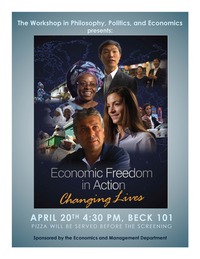
Date: Monday, April 20th, 2015
Time: 4:30 p.m. – 6:00 p.m.
Location: Beck Hall 101
This one-hour documentary examines the impact of increased economic freedom on the lives of ordinary people. The filmmakers traveled to countries as diverse as Chile and Zambia to profile entrepreneurs benefiting from increased economic freedom. The documentary highlights the Economic Freedom of the World (EFW) index and features interviews with the report's authors, including Josh Hall, who will give a guest lecture on May 4th.
Screening: Good Bye, Lenin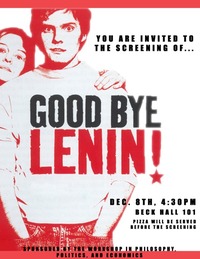
Date: Monday, December 8th, 2014
Time: 4:30 p.m. – 6:00 p.m.
Location: Beck Hall 101
A humorous look at the economic transition in the former GDR: A dedicated young German boy pulls off an elaborate scheme to keep his mother in good health in this comedy drama from director Wolfgang Becker. Suffering a heart attack and falling into a coma after seeing her son arrested during a protest, Alex's (Daniel Brühl) socialist mother, Christiane (Katrin Sass), remains comatose through the fall of the Berlin wall and the German Democratic Republic. Knowing that the slightest shock could prove fatal upon his mother's awakening, Alex strives to keep the fall of the GDR a secret for as long as possible. Keeping their apartment firmly rooted in the past, Alex's scheme works for a while, but it's not long before his mother is feeling better and ready to get up and around again."
Guest Lecture: You're So Money: Literary and Economic Seductions by Sara Skwire of Liberty Fund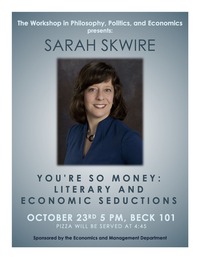
Date: Thursday, October 23rd
Time: 5 p.m. – 6:00 p.m.
Location: Beck Hall 101
Shakespeare's The Merchant of Venice has led many to believe that the early modern world had an unrelievedly negative view of money-lending and an unsophisticated view of economics. But The Merchant of Venice is only part of the story about Shakespeare's views on exchange and commerce. Reading his love sonnets and putting them into the context of other early modern seduction poems shows us a much more complicated--and even enthusiastically positive--image of early modern thinking about economics. Through erotic punning and word play, Shakespeare and his contemporaries invite us into a world where pleasure is a profit and profit is a pleasure.
Sarah Skwire is a Fellow at Liberty Fund, Inc., a non-profit educational foundation and the author of the college writing textbook, Writing with a Thesis, which is in its 12th edition. Sarah has published a range of academic articles on subjects from Shakespeare to zombies and the broken window fallacy, and her work has appeared in journals as varied as Literature and Medicine, The George Herbert Journal, and The Journal of Economic Behavior and Organization. She writes a regular column, Book Value, for the Freeman Online and blogs at Bleeding Heart Libertarians. Sarah's work on literature and economics has also appeared in the Freeman and in Cato Unbound, and she is an occasional lecturer for IHS, SFL, and other organizations. Her poetry has appeared, among other places, in Standpoint, The New Criterion, and The Vocabula Review. She graduated with honors in English from Wesleyan University, and earned a MA and PhD in English from the University of Chicago.
